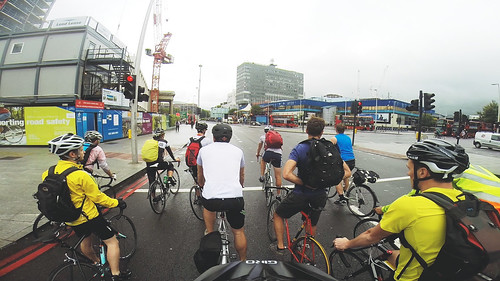In Florida--at least the part where my parents live--you can ride under a cloudless, sunny blue sky and see a downpour on the horizon. That storm might soak you in an hour, or even less.
The reason why oncoming weather (or the weather you're about to ride or drive into) is so visible is that the landscape is flatter than any of my jokes fell the one time I went to an open mike and there are no tall buildings. That means, of course, that you would never see approaching weather so clearly here in New York, especially in Manhattan.
Or would you?
This morning I took a spin up the Hudson River Greenway up to 125th Street. The chill in the air turned to outright cold as I approached the river, but I did not mind: It was invigorating and the surroundings are stimulating. However, I think I was able to see the rain that local meteorologists are predicting for tonight. Interestingly, it is supposed to come from the north--the direction in which I was riding when I took the photo (The George Washington Bridge is behind that veil of clouds)--rather than the west, as weather usually does.
August in Florida comes to November in New York. Who'd'a thunk?
The reason why oncoming weather (or the weather you're about to ride or drive into) is so visible is that the landscape is flatter than any of my jokes fell the one time I went to an open mike and there are no tall buildings. That means, of course, that you would never see approaching weather so clearly here in New York, especially in Manhattan.
Or would you?
This morning I took a spin up the Hudson River Greenway up to 125th Street. The chill in the air turned to outright cold as I approached the river, but I did not mind: It was invigorating and the surroundings are stimulating. However, I think I was able to see the rain that local meteorologists are predicting for tonight. Interestingly, it is supposed to come from the north--the direction in which I was riding when I took the photo (The George Washington Bridge is behind that veil of clouds)--rather than the west, as weather usually does.
August in Florida comes to November in New York. Who'd'a thunk?






